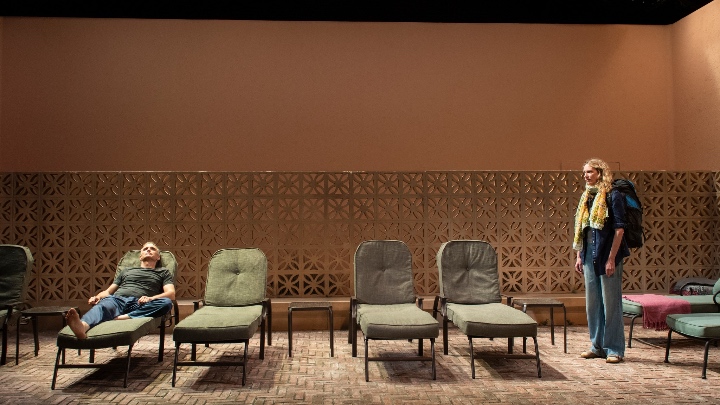The moment I’m describing is the announcement earlier this year that Annie Baker’s Infinite Life would have its world premiere at the Atlantic Theater in September 2023.
A little context to make things clearer. Two years ago, this play had been set to launch the 2021 season at off-Broadway’s Signature Theatre, but what should have been a joyful reemergence from COVID was not to be. Less than two months before the scheduled opening, the company cancelled Infinite Life.
Signature’s announcement was sudden, terse, and perplexing. They cited health concerns, which seemed logical. But they went ahead with other shows that season, and this postponement was “indefinite.” There was no reassurance that Infinite Life would actually come back to Signature—a company that had first presented John and The Antipodes, Baker’s two previous plays.
Theater conspiracy theorists (yes, I’m raising my hand here) speculated openly that there must be some bigger issue. Might the play actually not be finished? No, insisted Baker—though she is known for rarely commenting on her work, she made an exception here with (if I recall correctly) a short Tweet. Infinite Life was as finished as it would ever be, Baker said. As if to offer evidence, the Winter 2021 issue of Paris Review offered a 10-page excerpt… but after that, silence. Two more seasons were announced—both with no Annie Baker.
So where was Infinite Life?
I’d almost given up when I read the Atlantic announcement, which also had some intriguing new details. It would be a coproduction with the National Theatre in London; the director would be James Macdonald, a British director who had helmed Baker’s John there, and one of the featured cast members would be Marylouise Burke, who had played the lead role in that production. (Baker herself had been announced as director for the never-to-be Signature debut.)
So, it really was a thing! I jumped on tickets quickly, but there would be another snag: the performance I’d picked was cancelled, along with some others due to… yes, a COVID case in the cast. By that time, the show was nearly sold out, and the only option was toward the very end of the run. For several weeks, I worried—maybe the universe was conspiring against me? Would I ever ge there?
But I did, and I’m very happy to tell you that Infinite Life is not an illusion, nor is it in any sense unfinished. It’s a beautiful, moving, profound, often funny, sometimes disquieting study by an artist whose mastery of understatement is nonpareil.
So what is Infinite Life about?
If it’s a summary you want, that’s fairly easy. We are outdoors somewhere north of San Francisco—in a courtyard or perhaps by a pool: the stage is filled with groupings of chaise lounges. Five women come and go here. Sofi (Christina Kirk) is 47; Eileen (Burke), Elaine (Brenda Pressley), Ginnie (Kristine Nielsen), Yvette (Mia Katigbak) are all older. There’s also one male, Nelson (Pete Simpson) who’s a hunky guy in his 40s who likes to hang out shirtless. (Nelson here is the living definition of “odd man out.”) Everybody lies around chatting or reading or dozing, presumably to make it feel more like a vacation.
But it’s not. The group here are patients at a pain management clinic, staying for extended—though not always clearly defined—periods of time. The sources of their pain is not always clear; in some cases, recovery seems possible, in others not. For all them, there is a sense that this place is a court of last resort, and the treatment itself is extreme: liquid fasting, beginning with water only.
Baker paints this story with the lightest brushstrokes imaginable. Conversational loops are mostly short and open-ended; there’s little room for self-reflection, and less for pity. Talk often stops at a midpoint and doesn’t continue for seconds or minutes or sometimes just stops. (Baker’s celebrated love of pauses goes well beyond Chekhov’s.) The banter can be mundane or, as when Sofi attempts to explain the book she’s reading—which is Daniel Deronda(!)—inadequate to the task. (Kirk is particularly marvelous here, but the entire cast is superb.)
But they’re trying to keep a conversation going, along with a semblance of normalcy. Under the circumstances, that is exceptionally brave.
What I think Baker is trying to show here is nothing less than how we approach the moment when our frailty and ultimate mortality becomes impossible to ignore.
The women here do it with humor, charm, occasional vulnerability, but more often deep strength. They think about the Big Issues, of course—but also about more basic pleasure, including sexual hunger—not just for companionship or consolation, but for physical fulfillment. They don’t look heroic, but they are.
As a devoted Baker fanboy since at least The Flick, I also appreciated Infinite Life for reinforcing some of what I now recognize as the playwright’s leitmotifs. These include the use of stopped or elapsed time—
here, these intervals are announced out loud by Sofi. It’s deliberately jarring, but also cagey: these interruptions suggest the paradoxical way days can be an endless stream of sameness, and at the same time disconnected and disorienting.
Another Baker theme is to keep the talk quiet. We sometimes need to lean in to hear it, which makes it all the more powerful.
Another Baker theme is to keep the talk quiet. We sometimes need to lean in to hear it, which makes it all the more powerful.
But for me, the telling undercurrent I detected is this play’s connection to the late Georgia Engel, whose performance in Baker’s John remains one of the oddest and most moving I’ve ever seen in the theater.
Engel collaborated with Baker more than once (she was also in her adaptation of Uncle Vanya); she died in April 2019 at the age of 70, having done John in a couple of places, though not at the National, where Burke took on the role.
I wonder: had Engel lived longer, might she have played Eileen, the role Burke plays here? The character is stamped with the kind of saintliness that was very much a feature of Engel in John. She is meant to be a Christian Scientist, which Engel in life also was (obituaries made a point that the cause of death was unknown as Engel hadn’t sought medical intervention).
Perhaps most touchingly, Infinite Life—about which much is ambiguous—is specifically set in May 2019: one month following Engel’s death.
If I’m right, it’s a beautiful tribute as well as a superb piece of theater. We will all face this moment some time. I hope I do it with the wit and graciousness of this group.
__________________
Reading this over, I realize the review is more personal than my usual. Continuing in that vein, as I watched it, the themes of fragility and mortality seemed almost unbearably poignant so soon after the death of our beloved Parterreeditor and champion. He would so have loved Infinite Life, I think—I would certainly have loved sharing my review with him.
James, this is for you.
Photos: Ahron R. Foster






